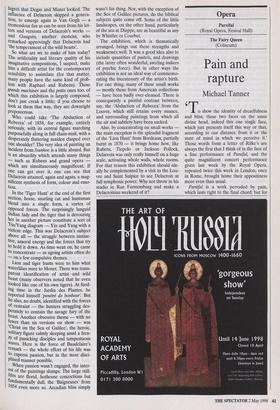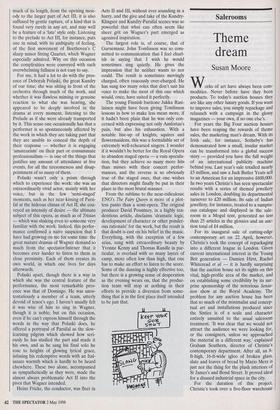'Opera
Parsifal (Royal Opera, Fesival Hall) Pain and
rapture
Michael Tanner
'T o show the identity of dreadfulness and bliss, these two faces on the same divine head, indeed this one single face, which just presents itself this way or that, according to our distance from it or the state of mind in which we perceive it.' Those words from a letter of Rilke's are always the first that I think of in the face of a fine performance of Parsifal; and the quite magnificent concert performance given last week by the Royal Opera, repeated twice this week in London, once in Rome, brought home their appositiness more even than usual.
Parsifal is a work pervaded by pain, which lasts right to the final chord; but for much of its length, from the opening mon- ody to the larger part of Act III, it is also suffused by gentle rapture, of a kind that is found very rarely in any art, and may well be a feature of a 'late' style only. Listening to the prelude to Act III, for instance, puts one in mind, with its ambiguity of feeling, of the first movement of Beethoven's C sharp minor String Quartet, which Wagner especially admired. Why on this occasion the complexities were conveyed with such overwhelming fullness is not easy to say.
For me, it had a lot to do with the pres- ence of Deborah Pulaski, the great Kundry of our time; she was sitting in front of the orchestra through much of the work, and whether it was flawless miming or genuine reaction to what she was hearing, she appeared to be deeply involved in the drama at every moment, listening to the Prelude as if she were already transported by it. This sense one occasionally has that a performer is so spontaneously affected by the work in which they are taking part that they are unable to conceal the depth of their response — whether it is engaging `amateurism' on their part or consummate professionalism — is one of the things that justifies any amount of attendance at live events, for all the tiresomeness and disap- pointment of so many of them.
Polaski wasn't only a prism through which to experience the work: she was an extraordinarily vivid actor, mainly with her voice, but in the few 'semi-staged' moments, such as her near-kissing of Parsi- fal at the hideous climax of Act II, she con- veyed an intensity of desire — the ultimate subject of this opera, as much as of Tristan — which was shaking even to someone very familiar with the work. Indeed, this perfor- mance confirmed a naive suspicion that I have had growing on me for some time: the great mature dramas of Wagner demand so much from the spectator/listener that it becomes ever harder to listen to them in close proximity. Each of them creates its own world, in which one lives for days afterwards.
Polaski apart, though there is a way in which she was the central feature of the performance, the most remarkable pres- ence was that of Domingo. He was unos- tentatiously a member of a team, utterly devoid of tenor's ego. I haven't usually felt it was wise of him to sing in Wagner, though it is noble; but on this occasion, even if he can't express himself through the words in the way that Polaski does, he offered a portrayal of Parsifal as the slow- learning pilgrim which showed how seri- ously he has studied the part and made it his own, and as he sang his final solo he rose to heights of glowing lyrical grace, infusing his redemptive words with an Ital- ianate warmth which is hardly to be heard elsewhere. These two alone, accompanied as sympathetically as they were, made the almost always problematic Act II into the pivot that Wagner intended.
Heinz Fricke, the conductor, was fleet in Acts II and III, without ever sounding in a hurry, and the give and take of the Kundry- Klingsor and Kundry-Parsifal scenes was so powerful that what can often seem like sheer grit on Wagner's part emerged as agonised inspiration.
The largest role is, of course, that of Gurnemanz. John Tomlinson was so com- mitted to communication that I feel churl- ish in saying that I wish he would sometimes sing quietly. He gives the impression that he neither wants to nor could. The result is sometimes movingly charged, often raucously over-charged. He has sung too many roles that don't suit his voice to make the most of this one which would, once, have suited it perfectly.
The young Finnish baritone Jukka Rasi- lainen might have been giving Tomlinson lessons in how to make less mean more, if it hadn't been plain that he was only con- cerned with expressing not only Amfortas's pain, but also his exhaustion. With a notable line-up of knights, squires and flowermaidens, this was a formidable set of extremely well-rehearsed singers. I wonder if it wouldn't be better for the Royal Opera to abandon staged opera — a vain specula- tion, but they achieve so many more hits than misses with their concert perfor- mances, and the reverse is so obviously true of the staged ones, that one wishes that directors might finally be put in their place in the most brutal manner.
From the sublime to the near-ridiculous: ENO's The Fairy Queen is more of a plot- less panto than a semi-opera. The original producer David Pountney, in a highly ten- dentious article, disclaims 'dramatic logic, development of character or other ponder- ous rationale' for the work, but the result is that doubt is cast on his belief in the music. Everything, with the exception of a few arias, sung with extraordinary beauty by Yvonne Kenny and Thomas Randle in par- ticular, is overlaid with so many layers of camp, more often low than high, that one has to make an effort to listen to the score. Some of the dancing is highly effective too, but there is a growing sense of desperation as the evening wears on, that the produc- tion team will stop at nothing in their efforts to provide a diversion from some- thing that is in the first place itself intended to be just that.



























































 Previous page
Previous page